
Having accessible SMS opt-in and SMS opt-out mechanisms is essential for the success of your campaigns. Giving and withdrawing consent is a fundamental right of the user, and it is protected by several legal frameworks worldwide.
Keep reading to discover these processes and how to ensure compliance when messaging customers.
Defining SMS opt-in
What does opt mean in text messaging? Simply put, when a customer opts to receive messages from your business, they are giving you consent to contact them.
Consumer consent is the cornerstone of the SMS opt-in marketing process. It is expressed by sending a certain text reply or code to a phone number, but it can also be done through a text message opt-in form or a website. As a result, users allow businesses to send them promotional offers, updates, alerts, or other types of messages.
To comply with standard regulations, an opt-in message should clearly describe what communications will be sent. In addition, it generally contains information on how to opt out of text messages in the future. If the user agrees, they are added to an SMS mailing list.
SMS opt-in categories
Opt-in text messaging comes in many shapes and sizes. Let’s look at the different categories and what sets them apart.
Double SMS opt-in
In SMS marketing, a double opt-in occurs when a customer joins a mailing list and is subsequently asked to confirm. The initial subscription can occur via SMS or another channel, such as in-store or on the company website.
Afterward, the company can ask them to reply “YES” via text to confirm that they want to be included in future marketing campaigns. Here is a variant of a double opt-in text message:
Thank you for visiting [Company Name] and signing up for our messaging list. Please reply YES to this message to confirm your subscription.
This is not a standard practice required by texting laws, but it is recommended. This is how to gain subscribers who are genuinely interested in your product and won’t report you for spamming them.
In addition, it’s a good way to keep a digital trail of your customers’ consent and protect your business from compliance-related penalties.
Soft SMS opt-in
Soft opt-in is an exemption under the Privacy and Electronic Communications Regulations. It states that you can send marketing messages using the customer data you collect when an individual buys your product or shows interest in your products or services.
If a customer has already received messages from you regarding the status of an order, a soft opt-in text message would be:
Thank you for your purchase! As a valued customer, we’ll send you exclusive offers and updates. Reply STOP to opt out.
It mainly targets customers who have already established a relationship with your brand. However, it is highly ambiguous, so it is best to ask for consent before sending any client communication.
Simple SMS opt-in
With a simple opt-in, also called a single opt-in, you need no confirmation from your client before sending marketing communications.
For example, customers receive the following message via SMS, email, or through a notification on the website:
Subscribe to our SMS alerts for exclusive discounts. Text CODE to [Phone].
They are instantly added to the SMS mailing list without any additional confirmation. This opt-in strategy’s disadvantage is that it leaves much room for error.
We strongly advise against using simple SMS opt-in methods, as you cannot prove the subscriber truly intended to join your list.
Medical business opt-in (HIPAA)
HIPAA stands for the Health Insurance Portability and Accountability Act, and its main purpose is to ensure the privacy and security of a patient’s health records. Here is an example of optimal SMS opt-in practices:
[Company Name] fully complies with HIPAA and requests your approval for future text exchanges. Reply YES if you consent.
Why is opt-in text messaging important?
Providing consumers with clear and concise opt-ins that allow them to express their consent is essential for your business’s reputation and legal standing. Here are the main reasons why:
It ensures compliance with legal requirements
Integrating a bulletproof SMS marketing opt-in mechanism into your campaigns ensures that your business complies with your country’s industry-wide legal requirements. Below, you can find a few examples of laws and guidelines opt-ins are subject to:
- Telephone Consumer Protection Act of 1991 (TCPA)
- Canada’s Anti-Spam Legislation (CASL)
- EU’s General Data Protection Regulation (GDPR)
- CTIA Messaging Principles & Best Practices
Carriers require clear opt-in consent to be obtained before sending texts via local 10DLC or toll-free numbers. Without it, your messages risk being blocked or flagged as spam, harming delivery and trust.
It increases clickthrough rates and conversions
According to industry statistics in 2023, SMS campaigns have a conversion rate of 29%, surpassing email by a whopping 11%. In addition, text messages have a CTR of 19% and an open rate of 82%. This starkly contrasts email campaigns, which feature an average open rate of 21%.
It’s no secret that customers love a good promotion or contest, as long as you don’t spam them with alerts about them. Therefore, adopting a transparent and respectful SMS opt-in strategy will boost your engagement and, eventually, your sales.
It fosters trust between your company and its customers
At the end of the day, having your customers’ trust is the most important aspect of any successful business. Allowing users to express their consent to receive messages from you and not sending anything to those who haven’t is a simple yet effective way to build a reliable brand image.
Need help with 10DLC compliance?
Learn what carriers expect from your Terms of Service and Privacy Policy when you’re using 10DLC numbers.
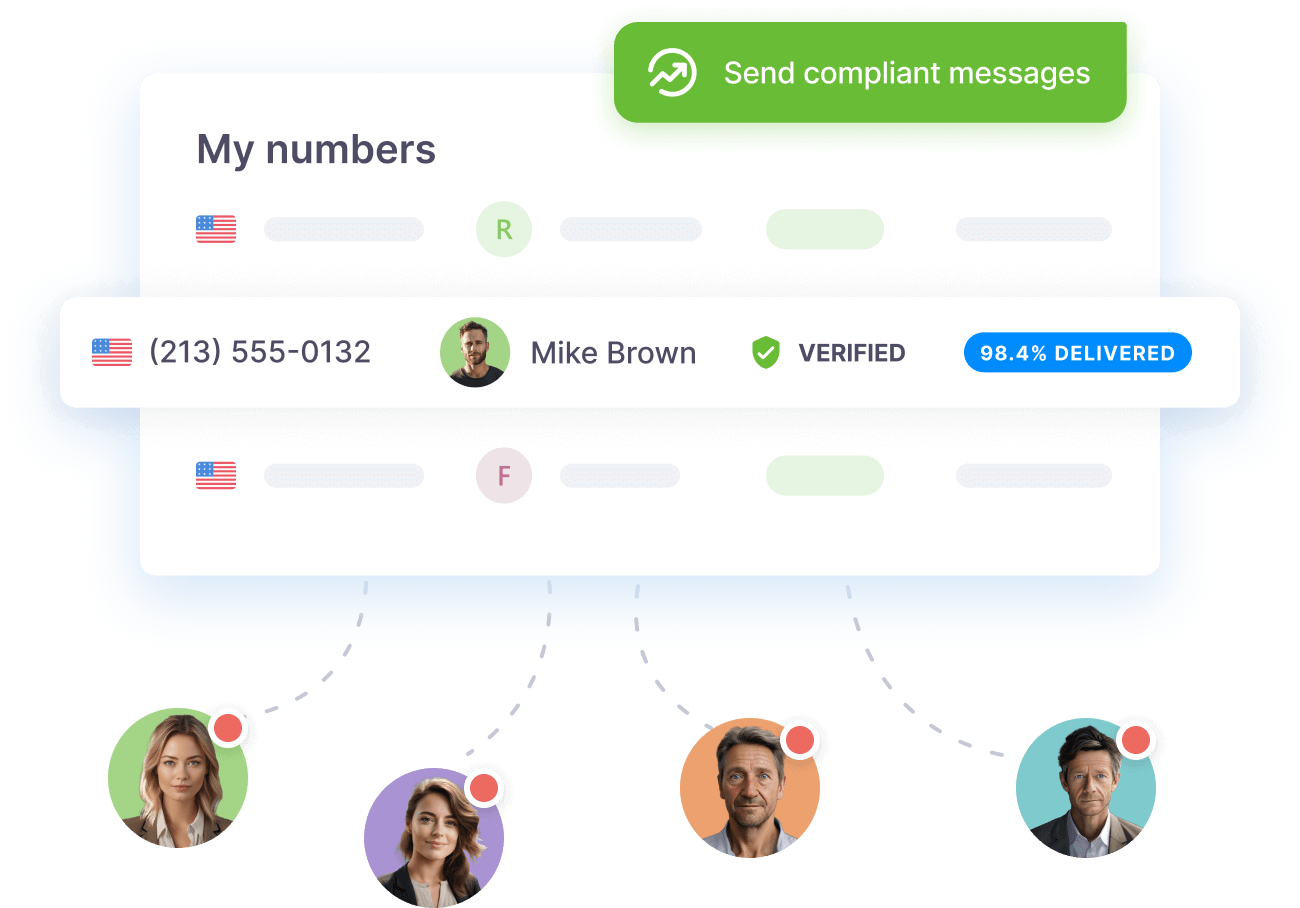
Different methods of opting-in
You can persuade your customers to receive campaigns from your brand in various ways. In this section, we will review several illustrated SMS opt-in examples.
1. Text-to-join (SMS keywords)
A restaurant advertises on its website: “Text ‘PIZZA’ to 12345 to receive exclusive deals and updates!” When customers send the SMS keyword to the specified number, they consent to receive promotional messages.

2. Online forms
A beauty website has a popup text message opt-in form on its homepage: “Subscribe to our SMS mailing list for a 10% discount on your first order!” Interested visitors can then fill out their names and phone numbers to join the database.
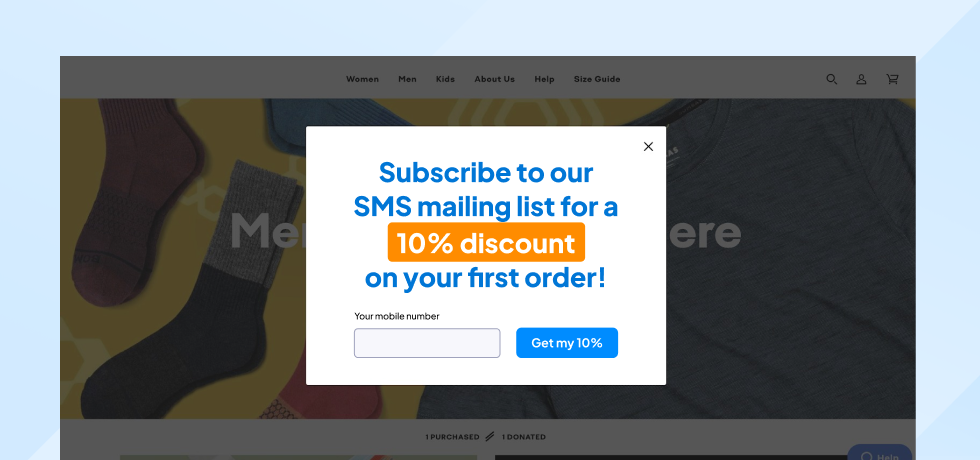
3. In-store sign-ups
At checkout, a clothing store has a physical or digital form where customers enter their phone numbers to join its SMS subscribers list to receive discounts. After submitting it, customers receive the following message: “Thank you for visiting our store. Reply YES to this message to receive promotional offers.”

4. QR codes
A coffee shop places a QR code on its menu: “Scan to join our Coffee Lovers Club and get a free drink on your next order!” Scanning will take interested customers to their SMS app with a pre-filled number and opt-in message.

5. Social media
A travel agency posts on their LinkedIn page: “Text ‘ADVENTURE’ to 12345 to get exclusive travel deals and destination ideas sent straight to your phone!” In doing so, customers will be subscribed to receive promotional messages from the company.

6. Email campaigns
A home decor brand you’ve subscribed to via email includes the following opt-in in their monthly customer newsletter: “Click here and fill out the form if you want to receive SMS updates and offers from us!” Clicking on the link takes you to an online SMS opt-in form where you can consent to receive SMS in addition to emails.
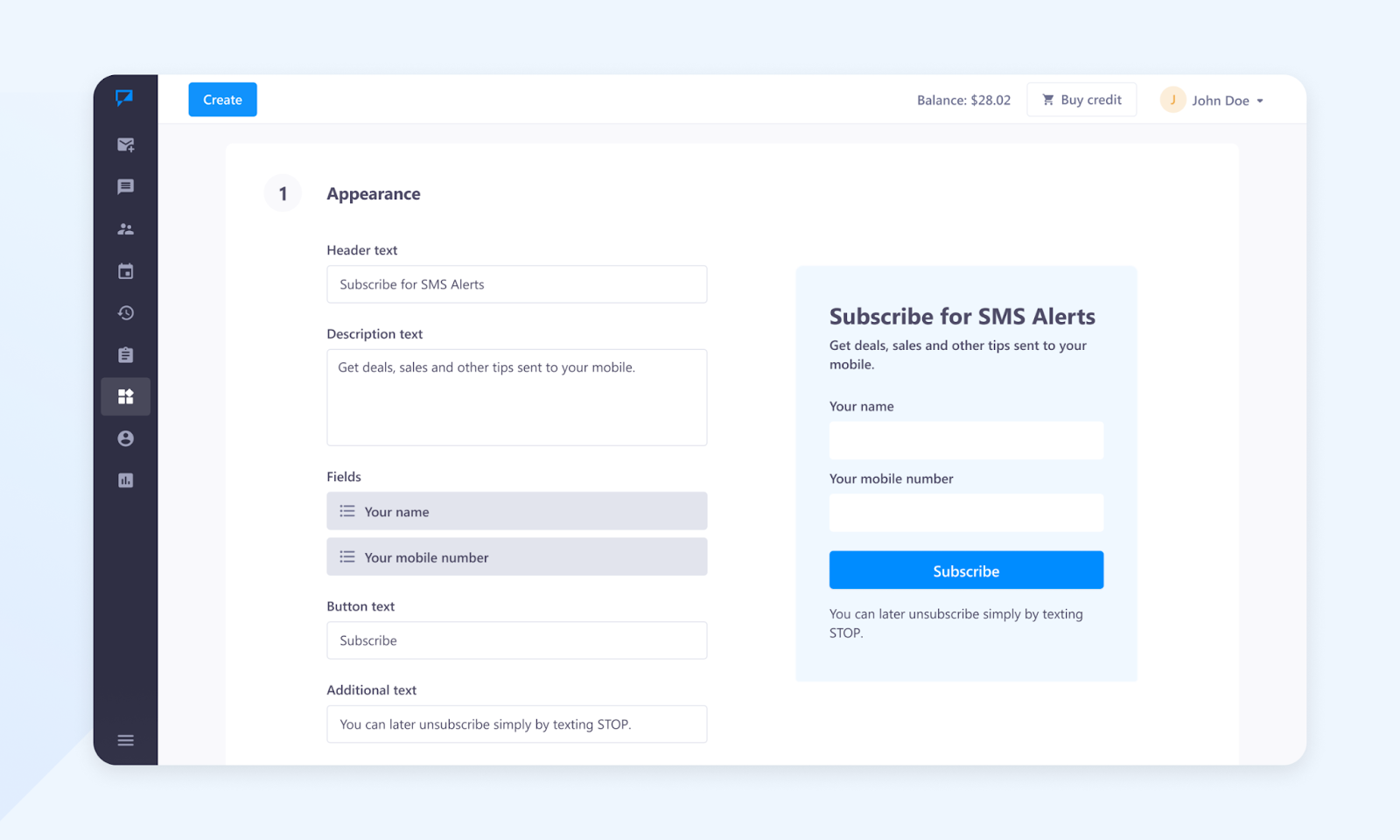
7. Contests and sweepstakes
A tech supplies store holds a raffle and displays the following ad: “Enter to win a new smartphone. Text ‘WIN’ to 12345 and get exclusive tech tips and offers!”

8. Customer service interactions
Following a customer support conversation, the agent who handled your case tells you: “Would you like to receive tips, updates, or offers via SMS? Then text ‘CARE’ at 1235 to subscribe to our mailing list.”

Crafting an effective opt-in message
An effective opt-in message can work wonders for your marketing strategy. But how do you put one together? Here are some aspects to consider:
- Consent. Every successful SMS marketing campaign starts with full legal compliance. Following opt-in SMS practices can boost your response rates and maximize engagement.
- Value. Offering educational content is the best way to keep customers engaged. Include links to live webinars or tutorials on how to use your product effectively.
- Conciseness. Tell clients why you ask for their consent, be it for marketing purposes, updates, or anything in between. Don’t go overboard by listing all your company’s advantages. You want to reel them in, not make an immediate sale.
- Support. If customers need help with your product or want more details, you should also provide various contact options. Add a phone number, email address, or WhatsApp number at the end of your text.
Managing opt-in lists
Properly managing your opt-in lists helps your company adhere to legal standards and enhances customer engagement.
Firstly, you should update your company’s mailing list regularly to remove inactive subscribers. This is also a great opportunity to correct errors, such as misspelled names or outdated contact information. Doing so will keep your database healthy and improve the effectiveness of your SMS campaigns.
We also recommend routinely re-verifying consent, especially for long-time subscribers. This will ensure compliance with regulations such as GDPR and help you keep an engaged user base.
While we’re on engagement, we recommend grouping your subscribers based on criteria relevant to your business goals—country, seat size, activity, or anything in between. This will allow you to tailor your outreach strategies accordingly.
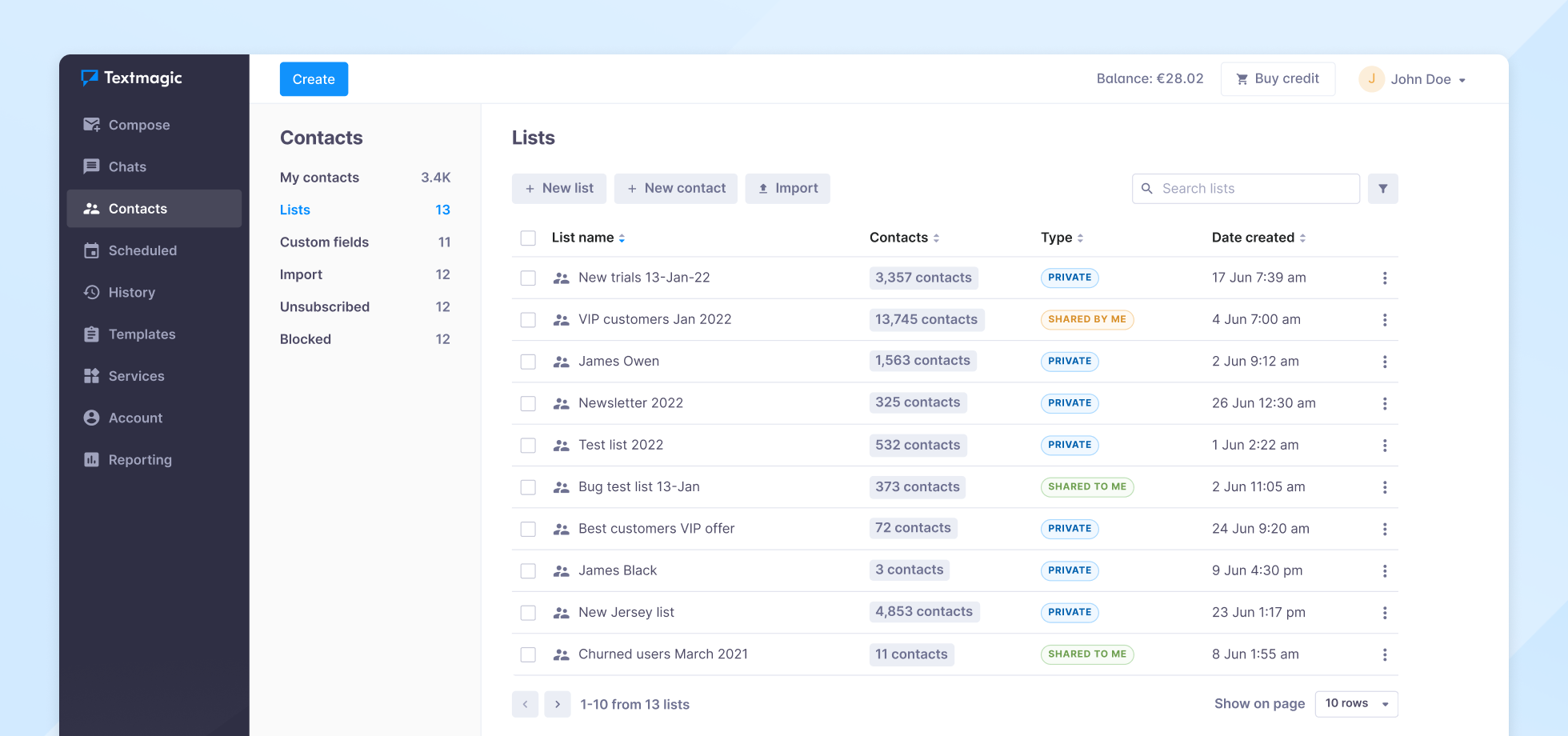
Segmenting your audience will increase the effectiveness of your messages and help you target customers across other marketing channels. Examples include email, social media ads, and even account-based marketing initiatives such as private events or webinars.
Defining SMS opt-out
Opting out of text messages is a fundamental consumer right and a pivotal mechanism that businesses must have in place to comply with the industry’s legal framework. An SMS opt-out system allows recipients to withdraw their previously expressed consent and thus stop receiving messages from non-consumer entities.
Giving your customers the choice to opt out is a sign of respect and helps maintain a positive relationship with them. Brands that make it easy to unsubscribe are often viewed favorably by their user base, as they demonstrate a commitment to autonomy and privacy. Plus, having accessible opt-out options significantly increases the deliverability of your messages.
Besides improving customer relationships and brand reputation, a proper opt-out process also ensures compliance with industry regulations. As previously mentioned, GDPR, TCPA, and other legal frameworks have established strict SMS communications guidelines, including the opt-out process.
To make the system not only accessible for your subscribers but also legally compliant, you need to keep the following points in mind:
- Clear opt-out instructions. Messages should include concise instructions on how to opt out of text messages. The standard practice is sending a “Text ‘STOP’ to opt-out” message, but allowing more inclusive language is recommended.
- Immediate processing and confirmation. Once an opt-out request is received, your company must ensure that no further messages are sent to that user and confirm their removal from your mailing list.
- No hidden costs. Opting out of text messages should be free of charge. Revoking consent is a fundamental right of the user, after all.
Handling opt-out requests
Having a strategy for handling SMS opt-out requests is essential. Properly managing these requests ensures your company’s compliance with industry standards while maintaining customer trust and satisfaction.
When an opt-out request is received, the company must immediately remove the user’s number from the messaging list. Continuing to message a user who has opted out can lead to complaints and potential legal action on their part.
To finalize the process, it is advisable to send a confirmation message to the user acknowledging their decision to opt out. This message should confirm that they will no longer receive messages and provide a brief note on how to opt back in if they change their mind. This step is optional but will further cement your reputable brand status.
Lastly, keeping a record of the opt-out requests you receive is a great way to adjust your current SMS marketing approach. This type of customer feedback is a valuable source that will allow you to detect and correct any negative trends.
How to set up SMS opt-in and opt-out with Textmagic
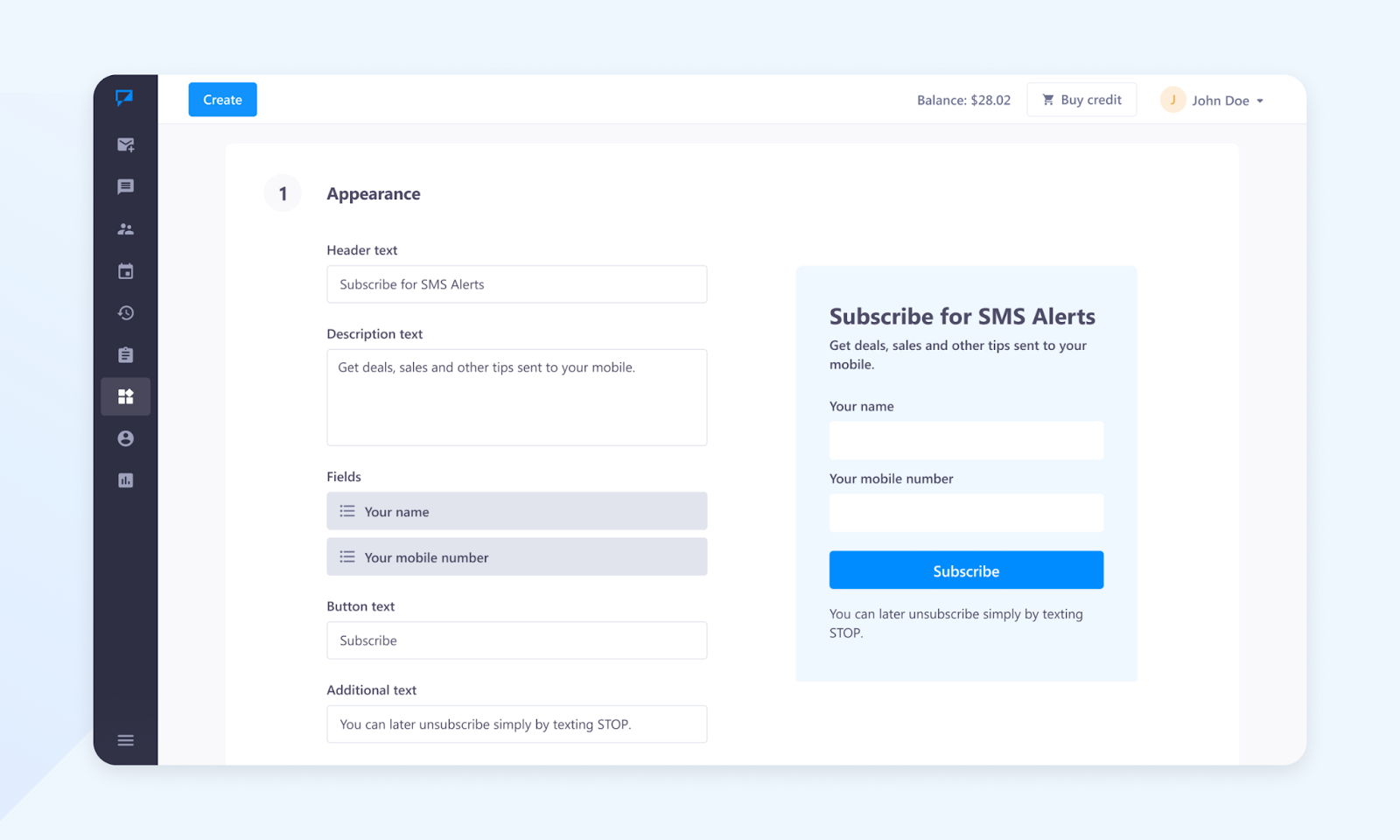
You can easily place a Textmagic form on your website to grow your list of mobile subscribers. We provide fully customizable subscribe and click-to-text forms.
To create a new form, log in to your Textmagic account or sign up for a free trial. Go to the Click-to-text section under the Services menu and select the Subscribe Forms tab. Follow the step-by-step instructions to configure your first form in minutes. Then, copy the code on your website to activate it.
Another option is to create an automation rule so people opt in by sending a designated keyword to your dedicated number. In the Textmagic app, you can do this by going to the Automation Rules section of the Services tab and creating a new rule.
Remember to include the opt-out option at the end of any communication to clarify to customers how to opt out of text messages. You can also set this from the Automation rules section.
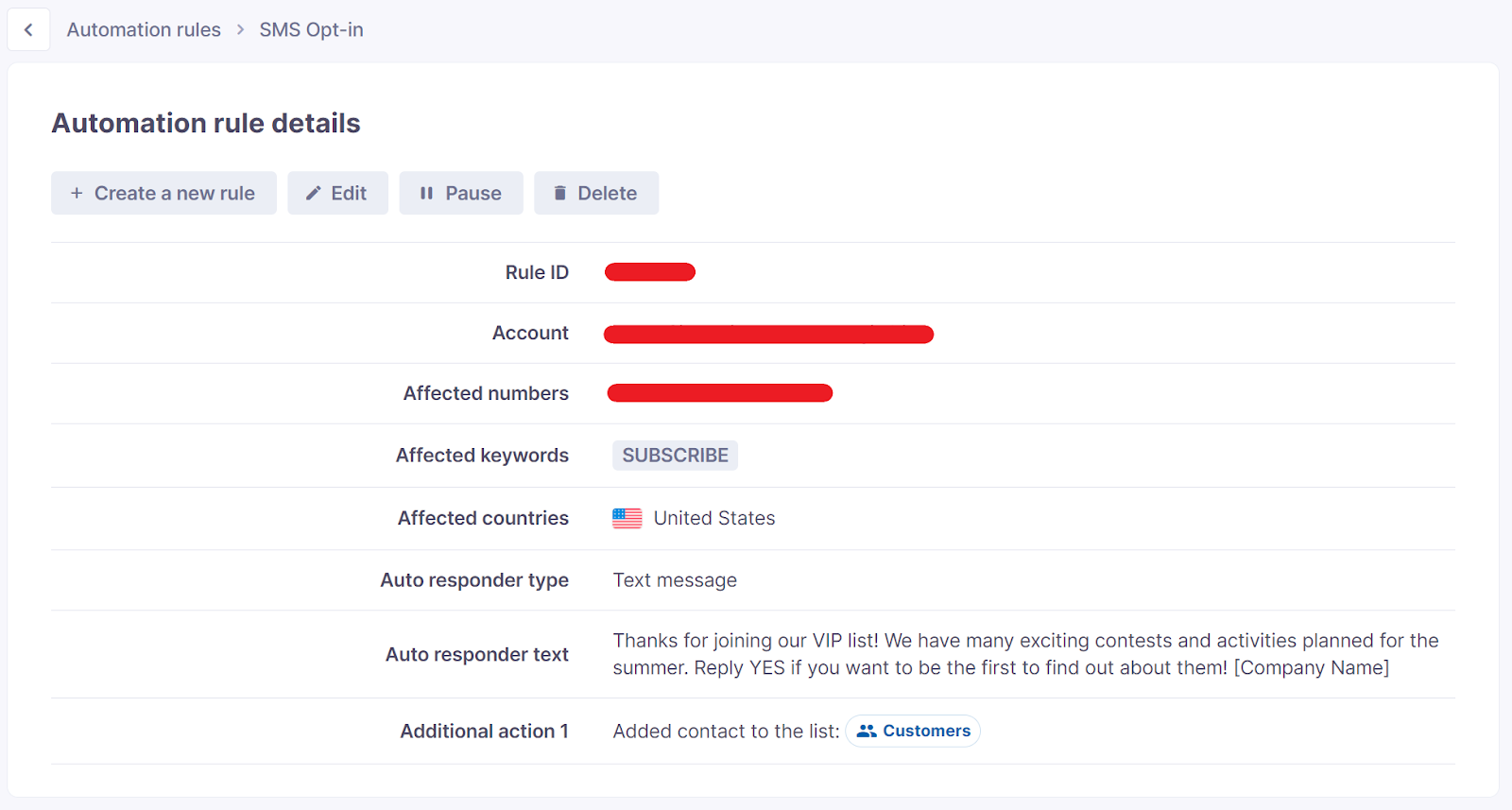
Conclusion
Properly managing your SMS opt-in and SMS opt-out processes will ensure compliance with legal requirements and foster trust within your customer base. Brands that ensure consent is at the forefront of their marketing efforts are seen as reliable and reputable, which is a key factor in a business’s overall success.
It is crucial to constantly adapt and tailor your approach to your customers and the industry’s needs. Frameworks can be updated, or new bills can be passed, making compliance more than a one-time endeavor—it’s an ongoing process. But with the right strategy, your campaigns can be both effective and fully legal.
Related articles
How to build and rebuild trust with your customers
Knowing how to build trust with customers is one of ...
How to create comprehensive API documentation: The ultimate guide
Discover essential tips for writing effective API do...
Communication breakdown: What it is and how to avoid it
Discover practical strategies to prevent and swiftly...
How to craft the perfect Thanksgiving text message
Thanksgiving is significant as a time for gratitude ...
Top 20+ marketing tools for small businesses: Your essential 2025 guide to growth
Explore our selection of tools for online marketing,...




